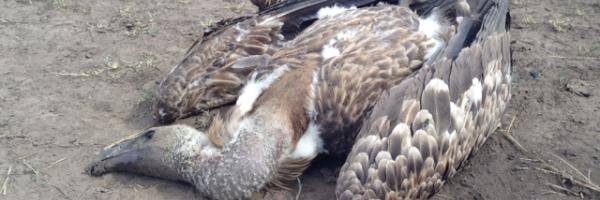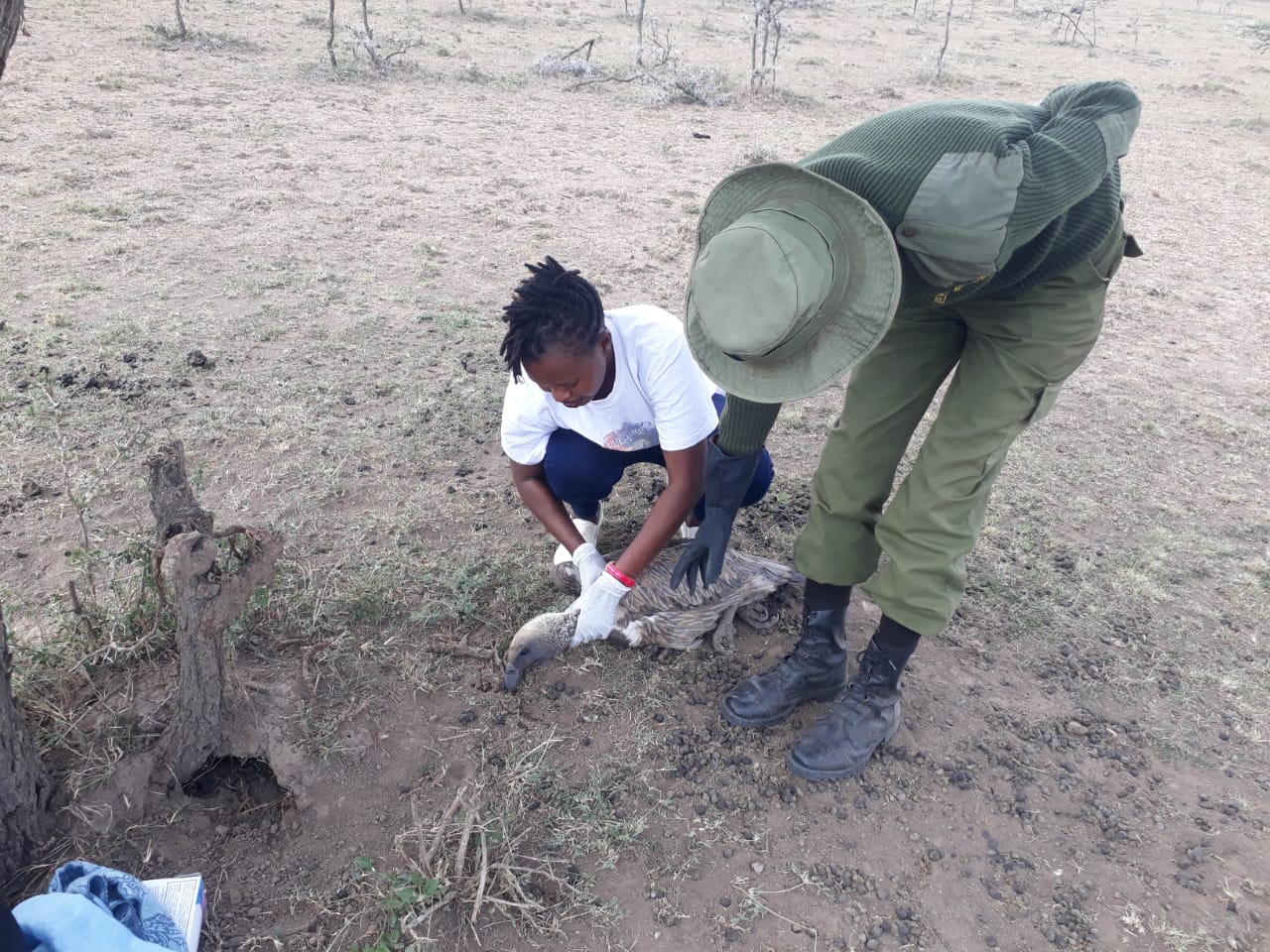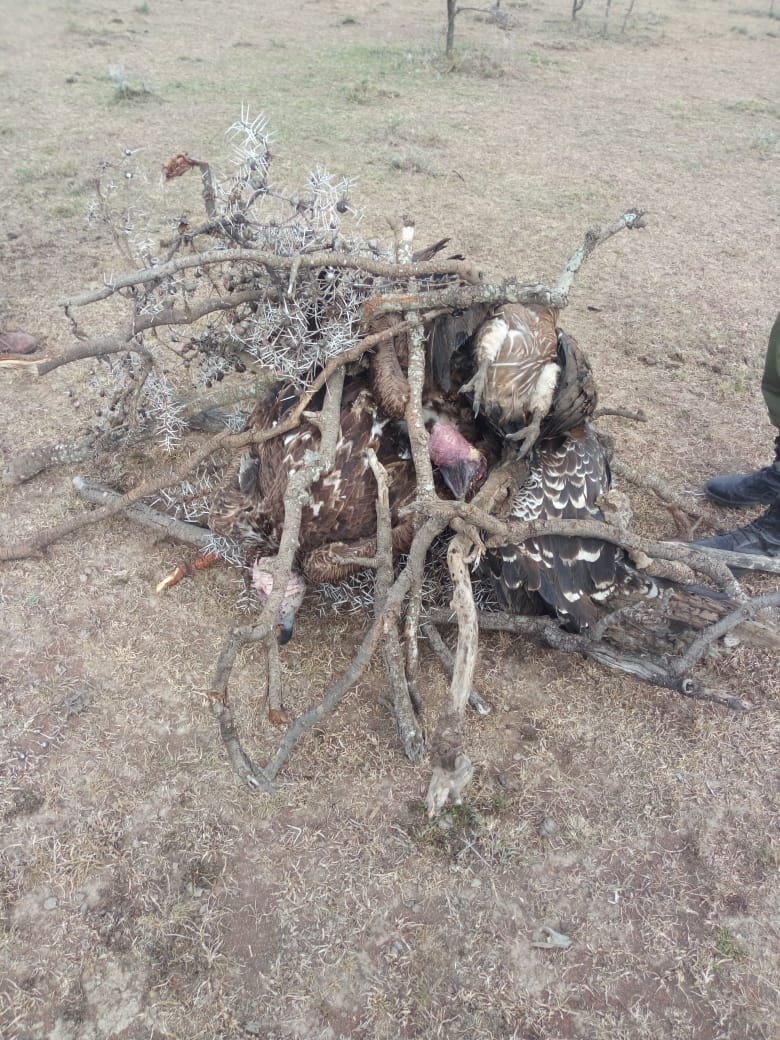Munir Virani
Nairobi, Kenya (15 November 2019) – A hyena, two Endangered Lappet-faced Vultures, and three Critically Endangered Rüppell’s Vultures were confirmed dead at the scene of an illegal poisoning event on Wednesday in Ol Kinyei Conservancy in the northeast Maasai Mara. Five vultures were found poisoned, but still alive, including three Rüppell’s, one juvenile White-backed, and one Lappet-faced Vulture. Sadly, one Rüppell’s Vulture died overnight. This poisoning incident is one of many that has drastically decreased populations of vultures throughout Kenya and across the continent of Africa, including incidents that have killed hundreds of vultures at one time. Fortunately, due to the training, organization, and quick thinking of one woman, Valarie Nasoita, and a network of Vulture Protectors, this situation did not become an even larger tragedy.
NGOs throughout the region have been collaborating and working hard to stop the scourge of retaliatory wildlife poisoning in southern Kenya that has devastated populations of critically endangered vultures and other scavengers. Retaliatory poisoning usually occurs when predators such as lions, hyenas, and leopards attack livestock. Without compensation in place, livestock farmers resort to lacing their dead livestock with easily accessible agro-chemicals with the intention to kill predators. Vultures that scavenge in large numbers on dead animals often succumb to the poison and hundreds can die as a result.
Nasoita, a Vulture Liaison Officer for The Peregrine Fund, a non-profit organization dedicated to the global conservation of birds of prey, has been working diligently with communities throughout the region to help them understand the value of protecting wildlife and the dangers that using poisons pose for wildlife, livestock, and human health. She studied wildlife management in Kenya’s Wildlife Service Training Institute and attended trainings for responding to and managing wildlife poisoning incidents and crime management. All of the training and hard work paid off when she arrived to the site of the poisoning and leapt into action – an exhausting eight hour effort to save nature’s treasures.
She initially heard about the incident from the Ol Kinyei conservancy manager, Simon Nkoitoi, who quickly reached out to Nasoita for help. When Nasoita arrived at the scene of the poisoning she recalls, “I was worried that there would be no one to help me capture and care for the vultures that were poisoned but still alive. Fortunately I was able to find two rangers from the conservancy who helped me catch each vulture and move them to the shade.”
Once in the shade, under the guidance of chief veterinarian Dr. Limo of Kenya Wildlife Service and Shiv Kapila from the Kenya Bird of Prey Trust via a special WhatsApp group of trained Vulture Protectors, Nasoita began administering first aid care to the birds. Kapila states, “Those five birds still alive have a good chance of survival because of the quick response and teamwork that got the birds stabilized and in our care. However, the hard part is only just beginning. The birds will take weeks to recover, and only with our 24 hour attention and care. The challenge for us remains huge.”
The coordination between the Kenya Bird of Prey Trust, the Kenya Wildlife Service, the Mara ranger staff, The Peregrine Fund and its partners not only gave this case a positive outcome, but has improved the number of birds saved and incidences quickly resolved at other poisoning scenes over the past few years. Kapila adds, “The quick decontamination of this scene has certainly stopped more deaths and shows how effective trained local ground teams are.” Kapila expects some of the sick birds will be healthy enough to release back to the wild once they have fully recovered.
Ralph Buij, Director of Africa Programs for The Peregrine Fund, is hopeful for the future. He states, “In the short term I hope that we can stabilize vulture populations after this continent-wide population crash. In the end, I hope we can convince people of the importance of vultures and their conservation and cause a shift in awareness and attitude toward wildlife poisoning. Also, more emphasis than now needs to put on the criminal persecution of those who now get away with killing these critically endangered birds.” With teammates like the Ol Kinyei rangers, Kapila and the Kenya Bird of Prey Trust, and dedicated staff like Nasoita, conservation efforts are on the right track.
Buij wants the world to understand that vultures are “beautiful creatures and exquisitely effective scavengers.” However, they are also on the brink of extinction in many parts of Africa. “I have seen vulture-less skies in West Africa,” recalls Buij, “where only 1-2% of former populations remain. It’s depressing and we need to do all that’s in our power to prevent that from happening elsewhere. Extinction is forever, yet avoidable if we care. We have no alternative. We must care.”
Reflecting on the exhausting day of work, trying to save five of these incredible birds and preventing the death of an untold number, Nasoita says, “I grew up in the Mara when the wildlife were so many. I hope that I can be one of the few who are educating and teaching the community about the benefits of the vultures. I want to encourage my community to stop poisoning and help us increase the numbers once again.”
With conservation heroes like Valerie Nasoita and all of the Vulture Protectors working to rescue this special group of birds on the brink, we can win this fight.
To learn more about the vulture poisoning in Africa issue, watch this video produced by the Cornell Lab of Ornithology and featuring biologists from The Peregrine Fund: https://www.youtube.com/watch?v=EfnnOpS_ljk
This work and our rapid response to stop the poisoning of African Vultures program is a partnership between The Peregrine Fund, Kenya Wildlife Service, the Kenya Bird of Prey Trust, Wageningen University, Nature Kenya, BirdLife Kenya, and the Endangered Wildlife Trust. It was made possible through funding and support provided by the BAND Foundation, the Whitley Fund for Nature, Kipeto Energy, Ltd., and the Shanbrom Family Foundation among many other valued supporters.








